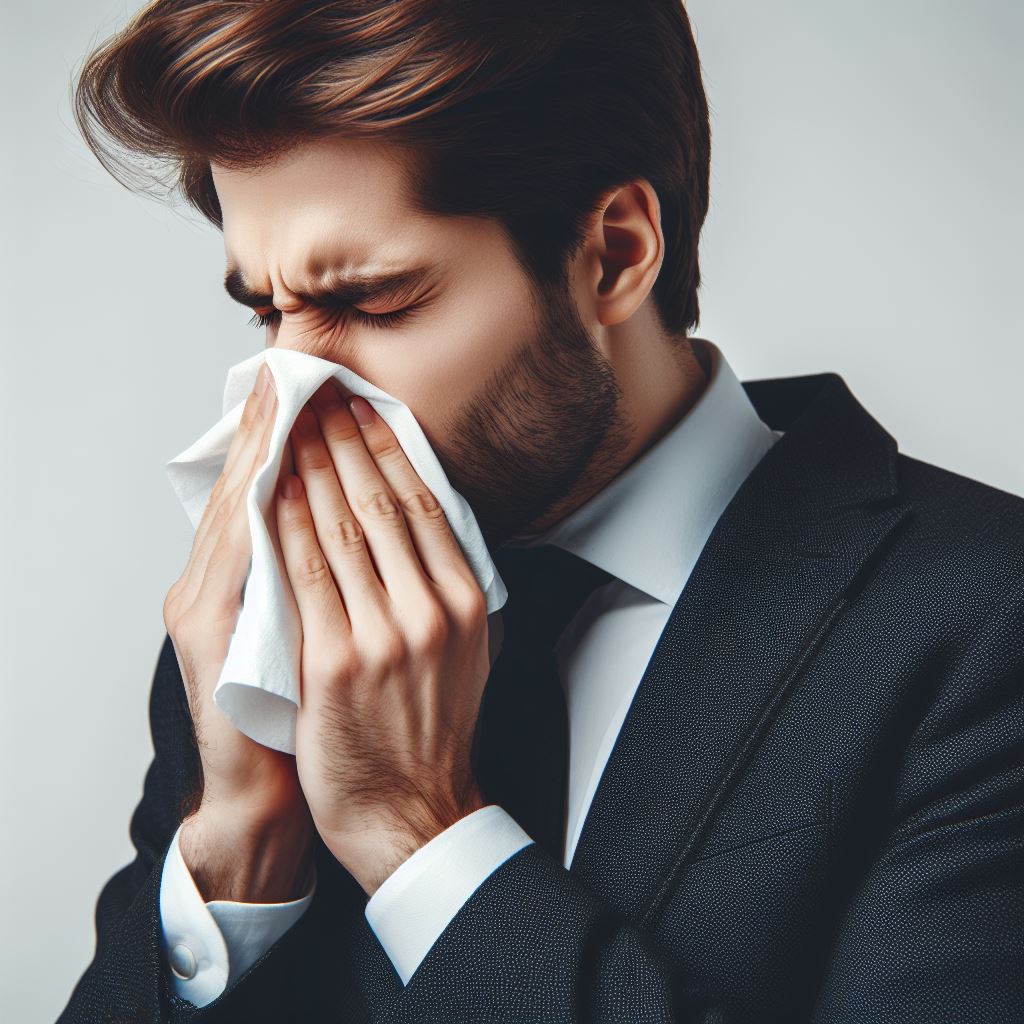Allergy

Allergic reactions can range from mild symptoms, like sneezing or itchy eyes, to more severe ones, like anaphylaxis. For mild to moderate allergies, several over-the-counter (OTC) treatments can help alleviate symptoms:
1. Antihistamines: These drugs counteract the effects of histamine, a chemical released during an allergic reaction.
Diphenhydramine (e.g., Benadryl): Effective but can cause drowsiness.
Cetirizine (e.g., Zyrtec)
Fexofenadine (e.g., Allegra)
Loratadine (e.g., Claritin)
Levocetirizine (e.g., Xyzal)
2. Decongestants: Help reduce nasal congestion.
Pseudoephedrine (e.g., Sudafed): Available behind the counter in many locations.
Phenylephrine (e.g., Sudafed PE): Less effective than pseudoephedrine but available on shelves.
3. Nasal Steroid Sprays: Reduce inflammation and treat symptoms like nasal congestion, sneezing, and runny nose.
Fluticasone (e.g., Flonase)
Triamcinolone (e.g., Nasacort)
Budesonide (e.g., Rhinocort)
4. Nasal Cromolyn (e.g., NasalCrom): A nasal spray that can prevent allergic reactions when taken prior to exposure to allergens.
5. Antihistamine Eye Drops: For itchy, watery, or red eyes.
Ketotifen (e.g., Zaditor, Alaway)
Olopatadine (e.g., Pataday)
6. Antihistamine nasal spray used for the relief of nasal symptom caused by allergens such as pollen, mold, dust, or pet dander.
Astepro
7. Saline Nasal Sprays or Rinses: Can help clear out allergens from the nasal passages and alleviate symptoms. Examples include simple saline sprays or more thorough rinsing systems like Neti pots or squeeze bottles. Ensure you use distilled, sterile, or previously boiled water if you’re preparing the saline solution yourself.
8. Allergy Skin Creams: For skin reactions like itching or rashes.
Hydrocortisone creams (e.g., Cortizone-10): Reduce itching and inflammation.
Calamine lotion: Helps soothe itching from allergens like poison ivy.
Lifestyle and Preventive Measures:
Stay Indoors: During high pollen count days or when the air quality is poor.
Air Purifiers: Can reduce indoor allergens.
Regular Cleaning: Helps minimize indoor allergens like dust mites and pet dander. Using a vacuum with a HEPA filter is particularly effective.
Pollen Masks: For outdoor work during high pollen days.
Shower Before Bed: Helps wash off any allergens from your hair and skin.
Important Considerations:
It’s crucial to identify the cause of your allergies. An allergist can provide testing and specific recommendations.
Be cautious about the potential drowsiness caused by some antihistamines, especially if driving or operating machinery.
People with certain health conditions or those taking specific medications should consult with a healthcare provider before starting any OTC allergy treatment.
For severe allergic reactions, it’s essential to have an epinephrine auto-injector (like EpiPen, Auvi-Q, or Adrenaclick) if prescribed. This is a life-saving medication for reactions like anaphylaxis.
Always consult with a healthcare professional for a proper diagnosis and tailored treatment recommendations.
Related: Sinus Congestion
Additional information:
Types of Allergies
Allergies come in various forms, each triggered by different allergens. The most common types include seasonal allergies, often caused by pollen from trees, grasses, and weeds. Food allergies, another prevalent type, can be triggered by foods like peanuts, shellfish, and dairy. Pet allergies are usually due to proteins found in pet dander, saliva, and urine. Dust mite allergies are triggered by tiny insects commonly found in household dust. Understanding the specific type of allergy is crucial for effective management and treatment.
Symptoms of Allergies
Allergy symptoms can range from mild to severe and vary depending on the type of allergy. Common symptoms include sneezing, runny or stuffy nose, itchy or watery eyes, and rashes. Some individuals with food allergies may experience stomach pain, vomiting, or diarrhea. In severe cases, allergies can lead to anaphylaxis, a life-threatening reaction requiring immediate medical attention. Recognizing these symptoms is key to managing allergies effectively.
Allergy Testing
To accurately diagnose allergies, healthcare professionals often recommend allergy testing. Skin prick tests are common, involving the introduction of small amounts of allergens into the skin to observe reactions. Blood tests can measure the immune system’s response to specific allergens. Patch tests are used for diagnosing contact dermatitis. Identifying the precise allergen is essential for targeted allergy management.
Immunotherapy for Allergies
Immunotherapy is a long-term treatment option for allergies. It involves gradually increasing doses of the allergen, either through allergy shots (subcutaneous immunotherapy) or under-the-tongue tablets (sublingual immunotherapy), to build tolerance. This method can be especially beneficial for those with severe allergies or those who can’t avoid specific allergens.
Non-Pharmacological Management of Allergies
Managing allergies isn’t just about medication. Lifestyle adaptations play a crucial role. For food allergies, avoiding specific allergens and reading food labels carefully is essential. For dust mite allergies, using hypoallergenic bedding and maintaining a dust-free environment can help. Avoidance of known allergens is often the first step in managing allergies.
Food Allergens and Allergies
Food allergies are triggered by specific food proteins. Common allergens include nuts, shellfish, eggs, and dairy. Avoiding these foods and being vigilant about cross-contamination is critical for those with food allergies. Reading labels and being aware of potential hidden allergens in processed foods is also important for managing food allergies.
Pediatric Allergies
Children’s allergies require special consideration. Symptoms in children may differ from adults, and management strategies need to be tailored to their age and lifestyle. Ensuring safe environments at home and school is crucial for children with allergies. Parents and caregivers should be educated about recognizing and managing allergy symptoms in children.
Impact of Climate Change on Allergies
Climate change is affecting allergy seasons, making them longer and more intense. Rising temperatures and CO2 levels lead to increased pollen production, exacerbating symptoms for those with seasonal allergies. Being aware of these changes can help individuals prepare and manage their allergy symptoms more effectively.
Allergen Avoidance Strategies for Allergies
Avoiding allergens is a key strategy in managing allergies. For pollen allergies, keeping windows closed during high pollen days and using air purifiers can help. For pet allergies, limiting exposure to pets and regular cleaning to remove dander is beneficial. Dust mite allergies can be managed by using dust-proof covers on bedding and frequent vacuuming with HEPA filters.
Emergency Management of Allergies
For severe allergic reactions, having an emergency plan is vital. This includes carrying an epinephrine auto-injector if prescribed and knowing how to use it. Awareness of the signs of anaphylaxis and seeking immediate medical help in such cases is crucial for safely managing allergies.
